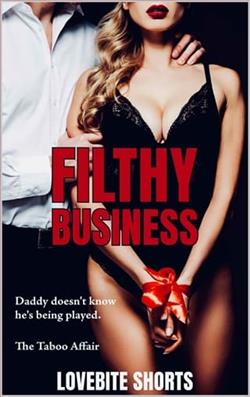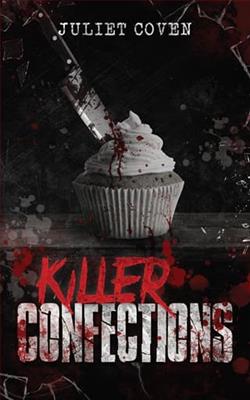Page 83 of Falling for You Again
The way she bites her bottom lip reminds me so much of myself.
“I wish I could explain,” she says.
“Please do. I need to know. Tell me what I did wrong.”
“You’ve done nothing wrong. It’s us, Meli. It’s always been us.”
Mom plucks a fresh tissue from her purse for me. The elevator dings for her floor and the doors open. Panicked, desperate for answers, I look at the open doors, then to Mom with a sinking feeling that once she steps off the elevator, she’ll go back to avoiding me and I will never get those answers.
But Mom surprises me. She presses the button that holds the doors open. Then she turns back to me. “Do you want to come home with me?”
My mouth turns down at the corners as I struggle not to cry harder. I nod. “Yes, I want to come home.”
Chapter 25
Heart to Heart
Mom asks if I’d like a cup of chamomile tea, and even though I don’t want one, I don’t decline. Because she’s my mom, and she’s invited me back to her apartment.
She busies herself in the kitchen, steeping our tea. I feel like she’s procrastinating. She isn’t much of a conversationalist, and as I sort through a multitude of questions to get her talking, I’m also wondering whether she’s always been this reserved. It almost seems like she has a fear of talking if she’s not in a familiar setting like the shop. My being here in her apartment is highly irregular, and that alone might have her withdrawing into herself. So I occupy myself looking around the apartment, letting her warm up to me.
The apartment isn’t the same unit we lived in before my parents left. The floor plans are similar—two beds and baths. All the windows in this apartment face the street in front as opposed to the building in back. I recall many evenings sitting at my window, watching the neighbors watch TV, prepare for bed, kiss, argue, live.
The furniture is also different, though I do recognize a few pieces, like the short, circular coffee table and the square dining table Dad built. I didn’t realize he crafted his own furniture. I always thought he’d made these pieces for clients. But it makes sense they’d need newfurniture when they returned. Uncle Bear had sold off what he hadn’t put in storage. Their lease ended while Dad was still imprisoned and Mom was off living elsewhere. I spot another one of his tables by the door and a media console, all beautiful pieces of elegant craftsmanship intermixed with the bold purples and blues of the sofas and pillows and artwork on the walls. Mom never was one for monochrome and neutral-toned aesthetics. She always gravitated to vivid colors, which could explain why I remember so much color in my childhood, now that I think on it.
I wander down the hallway, the wood flooring settling under my weight, to the room that would have been my room in the other apartment. I almost expect to see an explosion of teals and yellows, ruffles and bows from my youth. It now holds a hodgepodge of hobby supplies and household items. There’s a laptop on a desk buried under magazines and files. A blue sofa bed I doubt ever gets used as a bed. I don’t know if my parents host guests, not like they did before. Who would they have over? The only friends I know of are Dad’s and Uncle Bear’s bowling teammates. If Mom and Dad have a life outside of Artisant, I haven’t been privy to it.
My parents’ room at the end of the hall is simple, neatly furnished with Dad’s pieces: bedside tables, headboard, armoire, and dresser. Together they would have cost close to twenty grand had they purchased the items through Artisant’s website like any other client. As for the queen bed, I no longer know the people who sleep there.
I return to the living room. Mom sits at the table with our tea. Both hands hug her mug. I’m about to join her when I notice the one photo album we had from my childhood on the shelf. I pick it up.
“Do you still take pictures?” Mom used to enjoy photography. I haven’t seen her with a camera in years.
“Sometimes. I take pictures mostly of birds and flowers now. I’ve gone to the park on occasion and taken pictures of the dogs there. If their owners say okay. I always ask.”
I join her at the table and open the album. There is infant me, my little feet, button toes. Dad cradles me in one picture. Mom breastfeeds me in another. We look perfectly normal, loving. I wonder when it went downhill.
I flip through the pages and stop at my first trip to the beach. I couldn’t be older than one, and I’m naked as the day I was born, sitting in the sand between Mom’s legs. A wave tickles my toes. Mom sits behind me, keeping me balanced. Her eyes are closed and her head thrown back in laughter. We’re both laughing. I can almost hear my squeals of delight. It strikes me how Mom is in a lot of these photos.
“Your dad was good with the camera too,” she says as if reading my thoughts. “He used to be good with a lot of things.” Her tone is bitter with regret.
I am loaded with questions. I’ve been collecting them over the years as one would store positive affirmations in a glass jar. But I ask the most recent one that’s bewildered me.
“Why did you ask Dad to move out? It’s obvious you haven’t been getting along for a long time. You guys bicker all the time, and Dad’s always testing your patience. But why now? Is it because Uncle Bear sold the building?”
Mom sighs. “Not entirely. There are so many factors, Meli, so many reasons. I don’t know where to begin.”
“How about the beginning? Or with one factor? Start with that.” I’m willing to stay up all night if it means finally getting my answers.
Mom sips her tea, sets down the mug. Pauses. “I needed a break. Your dad keeps making stupid mistakes, and that uncle of yours keeps bailing him out. They never learn.”
I close the album and nudge the book aside. “Maybe you should start at the beginning instead.”
“You’re right. I never wanted you to hear this because your uncle was your legal guardian and you looked up to him. After your dad and I ...” She stops. “We really messed up, Meli. But your uncle, he lovedyou very much and you adored him and ...” Her gaze darts from me to her tea.
“Mom, if the past couple months have proved anything, it’s that Uncle Bear is far from perfect. I get that. Whatever you have to say won’t distort any glorified view you think I have of him. That’s gone.”
Mom grumbles something under her breath. “You didn’t think that when you were young, and we didn’t want you to look at him any other way. You already hated us.”















